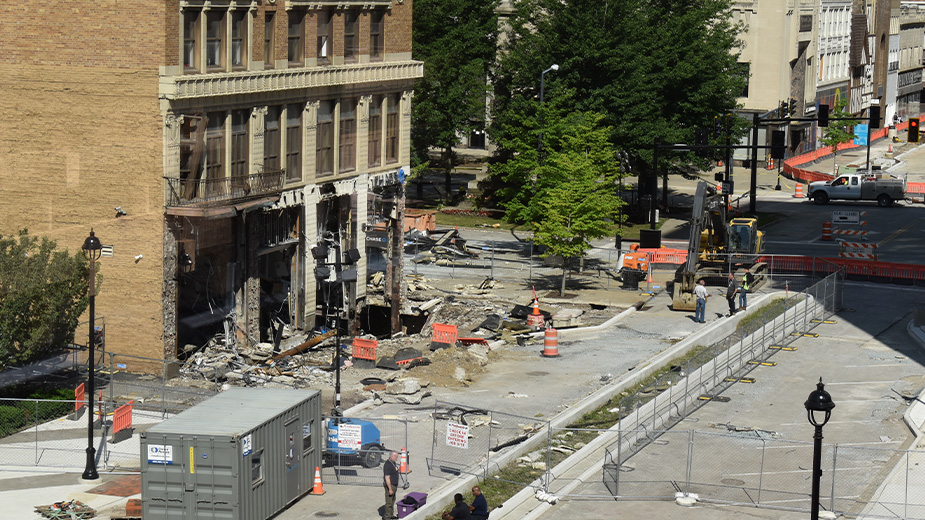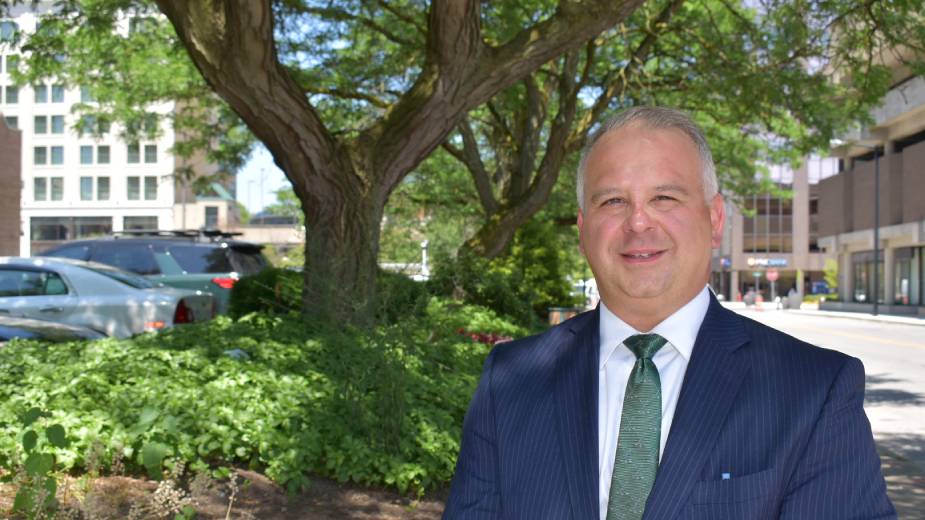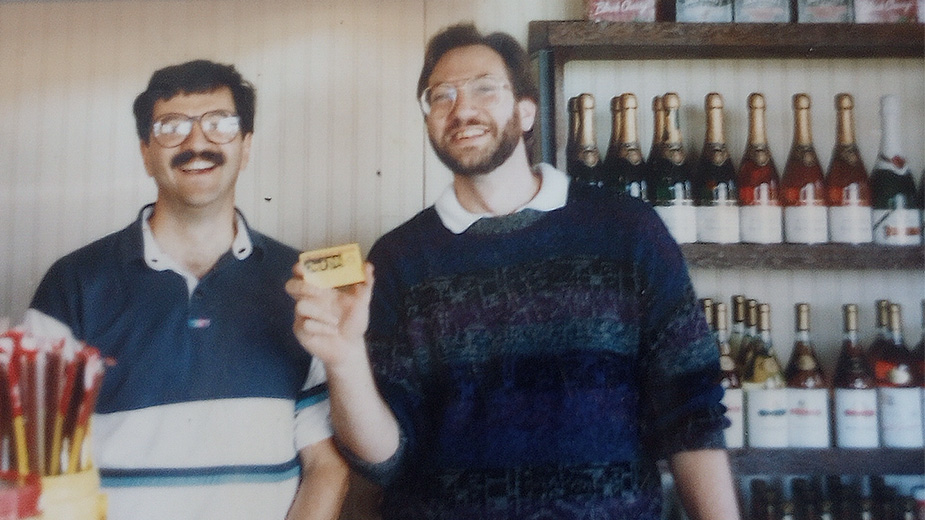Downtown Advocates Seek ‘Way Forward’ After Explosion
YOUNGSTOWN, Ohio – Longtime downtown Youngstown advocate Scott Schulick is seeking to rally downtown stakeholders and supporters in an effort to “find a way forward to secure downtown’s future” in the aftermath of the May 28 explosion at the Realty Tower.
Schulick, president of Youngstown CityScape’s board of directors, emailed a letter early Thursday morning to more than 50 business and community leaders in the downtown area.
“As I’ve watched the events unfold these past 15 days, it is clear that our community must come together to find a way forward,” he wrote in his email. “By now, we are all aware of the toll this has taken on the building’s residents, workers, Chase Bank, and the adjacent DoubleTree Hotel, Bistro 1907 and the International Tower. At this time, none of us know the fate of the building, but we do know that things are not looking positive.”
In the letter, he raises concerns over the building’s fate, including the economic impact its demolition would have, in combination with the impact of a potential closure of the DoubleTree by Hilton Youngstown Downtown hotel and the nearby International Towers apartments. Should Realty come down and the hotel and apartment building stay closed, the structures will join other “virtually empty” buildings on Central Square.
His letter cited the preliminary report performed by the structural engineer the city engaged, Barber & Hoffman Inc., which “does not necessarily recommend immediate demolition, but suggests the building and those adjacent remain closed until demolition of the building or if it can be made safe.” If the building were to be “made safe,” there would be more time to discuss its future and what it means for downtown, as well as the building’s historical and architectural significance.

Shulick looked back to the situation 15 years ago, when the then-owner of the Stambaugh Building, where the hotel and Bistro 1907 restaurant have operated since 2018, had removed the building’s windows, sparking concerns it would be razed. A similar coalition came together to prevent that from happening by working with the city, leading to the $40 million investment in the Albert Kahn-designed building that has served as “this economic engine for downtown both as a hotel and as a restaurant.”
Schulick said he sent the letter to individuals he identified from his contact lists whom he thought “might be interested in some of the same things that I was concerned about” regarding the building.
“My goal was to rally the community to come together and work together for the good of downtown, its long-term economic stability and what we can all do to address this situation together, not as individual organizations, not as individuals, but together with a common purpose,” he said Thursday.
As of early Thursday afternoon, some 25 or more of the people Schulick emailed had responded to his letter expressing support.
Those responding to the email pledging their support and/or that of the organizations that they represent include Guy Coviello, president and CEO of the Youngstown/Warren Regional Chamber; Aimee Fifarek, president and CEO of the Public Library of Youngstown & Mahoning County; Debora Flora, executive director of the Mahoning County Land Bank; JoAnn Stock, executive director of Leadership Mahoning Valley; Jim Kinnick, executive director of Eastgate Regional Council of Governments; Barb Ewing, CEO of the Youngstown Business Incubator; Bill Lawson, executive director of Mahoning Valley Historical Society; historic preservation architect Paul Hagman; Alexa Sweeney Blackann, interim CEO of Lake to River Economic Development; Sharon Letson, executive director of Youngstown CityScape; Bishop David Bonnar of the Catholic Diocese of Youngstown; and Aspasia Lyras-Bernacki, co-owner of Penguin City Brewing Co.
“I’m very grateful that Scott cast that net wide to all people that might be interested in helping, and he made some great points that are clearly from the heart,” Coviello said. “This is obviously somebody who cares a lot about the downtown.”
Before the explosion, Coviello said he and Mayor Jamael Tito Brown had been in the process of assembling a group of chamber board members to form a committee that would meet regularly with the administration to focus on growing the downtown economy. “It would be a nice public-private partnership that can turn this downtown into a very vibrant one,” he said.
Kinnick pledged Eastgate’s staff and resources to help bring downtown back. Additionally, he was optimistic that the building could be saved, provided that a structural engineering company could come and supply the lateral bracing that is now missing.
“Certainly that’s what we’re all hoping for as the best-case scenario,” he said.
If the building can’t be salvaged, “we have to look at the other vacant buildings downtown,” he continued. “We still have a waiting list of people trying to get apartments downtown.”
The Realty building with its tenants and the bank on the ground floor “are a key component to the economic engine of downtown,” and the potential threat of losing that “has so many rippling effects,” Hagman said.
“We need to, together, find a solution to save the building,” he continued, clarifying that he includes the building’s owners “in this group of folks who can work together to find the best solution.”
Hagman, who was able to get “relatively close” to the structure before the safety radius was established, also was optimistic that it could be saved, provided that “proper engineering intervention” is introduced.
“There’s substantial damage – they’re right to be very cautious – but at the same time it can, if we act quickly, be stabilized.”
The situation has many complexities, with private ownership, public investment, insurance companies and governmental agencies involved, and what happens with the building might not involve the coalition that is being formed, Schulick acknowledged. Ideally, the building could be “not just stabilized but deemed safe because of repair work that could be done,” permitting the hotel and Bistro 1907 to reopen, he said.
“I’m hopeful that if the building can be stabilized in the short term, we as a community can pause and think about the impact of the decision to demolish or the decision to shore up and save the building will be for the long-term economic viability of downtown,” he said.
Pictured at top: Scott Schulick, vice president, investment, at Stifel Nicolaus and president of Youngstown CityScape’s board of directors.
Schulick’s letter can be viewed below.
Copyright 2024 The Business Journal, Youngstown, Ohio.



